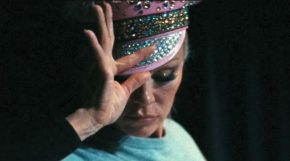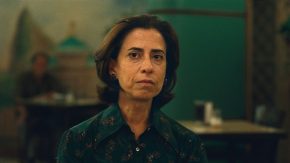You know that one when the Belgian, the English, the Italian and the Russian go in a… well, nowadays rather nowhere. Four conductors, just like their orchestras and singers, still cannot travel to Budapest to take part in the first Bartók Spring, so they will all broadcast a wonderful concert from their homes. Being artists, their current home is not always identical with their country of origin. While we can hear a totally Italian musical experience from Riccardo Chailly, and Sir John Eliot Gardiner also plays from his homeland England, we can see the Belgian René Jacobs conducting in Switzerland and the Russian Vasily Petrenko in England. Let’s see now what these maestros bring to our homes!
Who is Vasily Petrenko?
This was the ultimate question for musical and artistic journals in the UK, after the Royal Philharmonic Orchestra announced in the summer of 2008 that he will conduct them from season 2021/2022 onwards. A rhetorical question, obviously, as Petrenko’s name was already known among professional circles. The Russian-born conductor started to work in the UK in the early 2000s, starting off as the youngest conductor for the Royal Liverpool Philharmonics ever. Then, in 2007, he was one of eight people chosen in a ten-year programme to make classical music accessible and more popular among the audience, most importantly schoolchildren.

“The most important thing is the sense of discovery and the sense of inclusivity – in terms of the public who will be welcomed to the concerts. There is also the importance of diversity and making classical music accessible to anyone. To understand classical music you need no language – it’s a direct link from heart to heart.”
He said this in the context of playing in a concert hall with 5000 seats; the rows might be filled by those young adults whom he opened the gate for classical music a decade ago. Petrenko also conducted the youth, as he worked with the National Youth Orchestra from 2008 to 2013, and meanwhile he also had a long-term contract with the Oslo Philharmonics. (When did he have time to sleep…?) But now, the Oslo and Liverpool contracts are over, and his new great adventure starts with the Royal Philharmonic Orchestra, whom he will conduct on 17 May in the Royal Albert Hall.
A John from the past and one from the present
Thirty-five years ago, a version of Bach’s St John Passion was recorded, conducted by Sir John Eliot Gardiner and setting a milestone for the subsequent performances of this piece. Gardiner debuted in 1964 and now one of the most important and central personalities of early music: he even wrote a book about Bach. We can guess from his words how much he appreciates the St John Passion:
“I recorded the piece for the first time for Archiv Produktion back in 1986 and it remains truly special to me. Bach conceived the piece as much as an act of worship as a work of religious art. Almost 300 years after it was heard for the first time, it continues to move listeners of all faiths and none.”

This is what organisers in the Sheldonian Theatre Oxford must have had in mind, because they invited Gardiner with his Monteverdi Choir and English Baroque Soloists especially for Good Friday. On 14 May, we can listen to the recording of this concert, this time as part of the Bartók Spring. It is known from historical sources that Bach had many difficulties related to the St John Passion. It was already announced for the wrong church on the day of its premiere, and then came the rewriting, the bitter fights with funders, putting the piece aside, and then, shortly before his death, Bach came back to an original version prior to the rewritings. As if he knew that in our weird 21st century, so many people will listen to this work, and even keep the memory of concerts in the form of recordings…
René Jacobs, a poetic conductor
The career of this Belgian musician was far from boring: he started singing as a member of a boy choir, then became famous in the world of opera as a countertenor. Then he switched to conducting, baroque and classicism being his focus. Just like Gardiner, Jacobs also likes Bach – like his huge dream was to record the St Matthew Passion -, but now we can hear something else from him: Haydn’s Stabat Mater with the Kammerorchester Basel and four soloists.

In the teaser of this 8 May concert we can read surprisingly humble and revealing words by Haydn, who admits to use ‘all his strength’ to write music to this medieval hymn to Mary, and he was most surprised when a great componist of his age, Johann Adolph Hasse, approved the piece. This story resonates well with an earlier statement by René Jacobs, where he reflects on his conductor career built up on his past as a singer:
“Because singers are always involved with the text before the music, the conductor has to be in love with poetry. But that is rarely the case. When I prepare an opera, for instance, before really study the score, I study the libretto at home. That can take several days. When the time of the rehearsal has come, I also work with singers on recitative. For me, the poetry without the notes of the composer is still music.”
Riccardo Chailly and the musical anniversaries
Bartók was born 140 years ago, Stravinsky died 50 years ago. These anniversaries motivated conductor Riccardo Chailly and the Filarmonica della Scala to contribute to the Bartók Spring with the Romanian Folk Dances, The Soldier’s Tale Suite, and The Rite of Spring. The concert will be broadcasted from the Teatro alla Scala in 7 May, so Chailly has to recall his memories how it felt to indeed play in Budapest:
I remember my Budapest debut in 1980, when at the age of 27 we performed Stravinsky’s Rite of Spring in the Opera House. I recall the first rehearsals too, and the concert we gave in the Erkel Theatre a couple of days later. I well remember realizing something I managed to sense through my contact with Hungarian musicians: just how important music is in this city. That’s why I’m very pleased to be taking part in launching a festival dedicated to Bartók. I’ve programmed a short piece by him, a real gem: the Romanian Folk Dances. This brilliant work, barely five minutes long, is full of joy, and Bartók gave it a very special orchestration.”

Well, the fullest joy would be, obviously, if the pandemic was finally over and we could greet Riccardo Chailly, René Jacobs, Vasily Petrenko and Sir John Eliot Gardiner in Hungary with their orchestras and singers. But as the Italian maestro spoke out in everyone’s name, they have to break silence even now, even like this, in front of empty rows and silent, indifferent cameras. Because they know that behind that camera, there is us, and we wait for them, listen to them with enthusiasm, and even clap at the end, hoping that they hear it in their heart. Because not only musicians cannot choose silence, but the audience neither…



























Comments